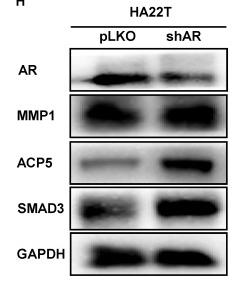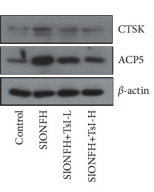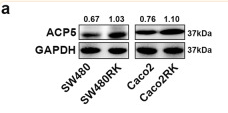ACP5 Antibody - #DF6989
| 製品: | ACP5 Antibody |
| カタログ: | DF6989 |
| タンパク質の説明: | Rabbit polyclonal antibody to ACP5 |
| アプリケーション: | WB IHC |
| Cited expt.: | WB |
| 反応性: | Human, Mouse, Rat |
| 予測: | Pig, Bovine, Horse, Sheep, Rabbit, Dog |
| 分子量: | 37kDa; 37kD(Calculated). |
| ユニプロット: | P13686 |
| RRID: | AB_2838945 |
製品説明
*The optimal dilutions should be determined by the end user. For optimal experimental results, antibody reuse is not recommended.
*Tips:
WB: For western blot detection of denatured protein samples. IHC: For immunohistochemical detection of paraffin sections (IHC-p) or frozen sections (IHC-f) of tissue samples. IF/ICC: For immunofluorescence detection of cell samples. ELISA(peptide): For ELISA detection of antigenic peptide.
引用形式: Affinity Biosciences Cat# DF6989, RRID:AB_2838945.
折りたたみ/展開
Type 5 acid phosphatase; Acid phosphatase 5 tartrate resistant; Acid phosphatase 5, tartrate resistant; ACP5; EC 3.1.3.2; MGC117378; PPA5_HUMAN; serum band 5 tartrate-resistant acid phosphatase; SPENCDI; T5ap; Tartrate resistant acid ATPase; Tartrate resistant acid phosphatase type 5; Tartrate resistant acid phosphatase type 5 precursor; Tartrate-resistant acid ATPase; Tartrate-resistant acid phosphatase type 5; TR AP; TR-AP; TRACP 5; TRAP; TrATPase; Type 5 acid phosphatase;
免疫原
A synthesized peptide derived from human ACP5, corresponding to a region within N-terminal amino acids.
- P13686 PPA5_HUMAN:
- Protein BLAST With
- NCBI/
- ExPASy/
- Uniprot
MDMWTALLILQALLLPSLADGATPALRFVAVGDWGGVPNAPFHTAREMANAKEIARTVQILGADFILSLGDNFYFTGVQDINDKRFQETFEDVFSDRSLRKVPWYVLAGNHDHLGNVSAQIAYSKISKRWNFPSPFYRLHFKIPQTNVSVAIFMLDTVTLCGNSDDFLSQQPERPRDVKLARTQLSWLKKQLAAAREDYVLVAGHYPVWSIAEHGPTHCLVKQLRPLLATYGVTAYLCGHDHNLQYLQDENGVGYVLSGAGNFMDPSKRHQRKVPNGYLRFHYGTEDSLGGFAYVEISSKEMTVTYIEASGKSLFKTRLPRRARP
種類予測
Score>80(red) has high confidence and is suggested to be used for WB detection. *The prediction model is mainly based on the alignment of immunogen sequences, the results are for reference only, not as the basis of quality assurance.
High(score>80) Medium(80>score>50) Low(score<50) No confidence
研究背景
Involved in osteopontin/bone sialoprotein dephosphorylation. Its expression seems to increase in certain pathological states such as Gaucher and Hodgkin diseases, the hairy cell, the B-cell, and the T-cell leukemias.
Lysosome.
Belongs to the metallophosphoesterase superfamily. Purple acid phosphatase family.
研究領域
· Cellular Processes > Transport and catabolism > Lysosome. (View pathway)
· Human Diseases > Immune diseases > Rheumatoid arthritis.
· Metabolism > Metabolism of cofactors and vitamins > Riboflavin metabolism.
· Metabolism > Global and overview maps > Metabolic pathways.
· Organismal Systems > Development > Osteoclast differentiation. (View pathway)
参考文献
Application: WB Species: Human Sample: SW480 and Caco2 cells
Application: IF/ICC Species: Human Sample: SW480 and Caco2 cells
Application: WB Species: Sample: RAW264.7 cells
Application: WB Species: Human Sample: HCC cells
Application: WB Species: Rat Sample:
Restrictive clause
Affinity Biosciences tests all products strictly. Citations are provided as a resource for additional applications that have not been validated by Affinity Biosciences. Please choose the appropriate format for each application and consult Materials and Methods sections for additional details about the use of any product in these publications.
For Research Use Only.
Not for use in diagnostic or therapeutic procedures. Not for resale. Not for distribution without written consent. Affinity Biosciences will not be held responsible for patent infringement or other violations that may occur with the use of our products. Affinity Biosciences, Affinity Biosciences Logo and all other trademarks are the property of Affinity Biosciences LTD.





